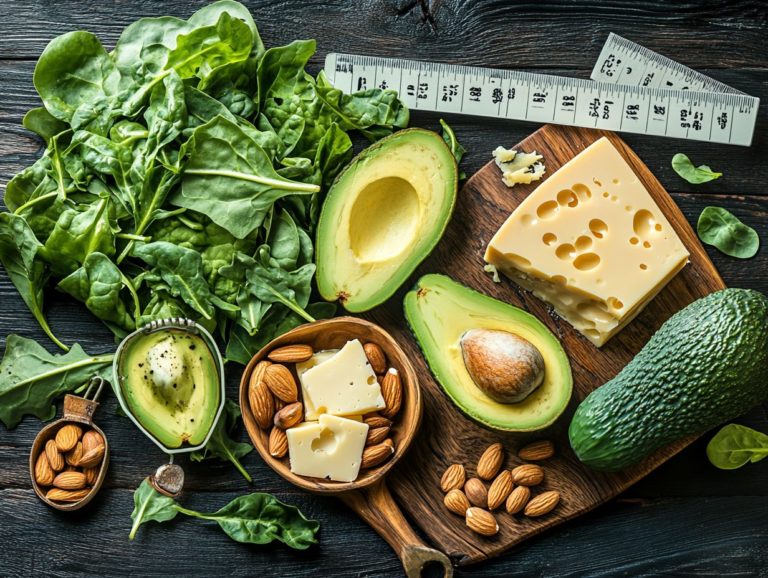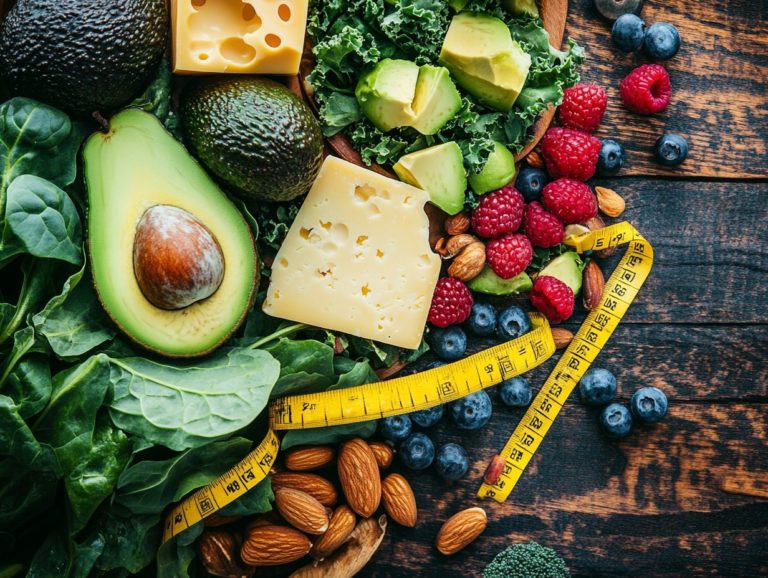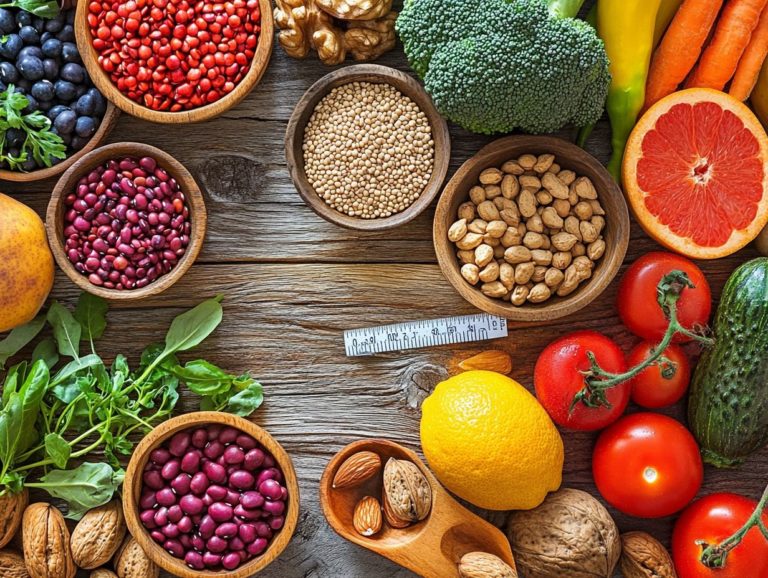The Science Behind Nutritional Ketosis
Contents
- The Science Behind Nutritional Ketosis
- Key Takeaways:
- What is Nutritional Ketosis?
- How Does Nutritional Ketosis Work?
- What are the Benefits of Nutritional Ketosis?
- What are the Different Types of Ketogenic Diets?
- Conclusion
- 3. Moderate Protein Intake
- Is Nutritional Ketosis Safe for Everyone and What Are the Dietary Guidelines?
- 1. Potential Side Effects and Health Risks
- Frequently Asked Questions About Nutritional Ketosis
- What is Nutritional Ketosis and How Does It Work?
- How does Nutritional Ketosis work?
- What are the Health Benefits of Nutritional Ketosis?
- Is Nutritional Ketosis Safe for Everyone and What Are the Dietary Guidelines?
- Can I Eat Any Type of Fat on a Nutritional Ketosis Diet and What Are the Best Fat Sources?
- How Long Does It Take to Enter Nutritional Ketosis and What Factors Influence This?
The Science Behind Nutritional Ketosis
Nutritional ketosis is rapidly becoming a sought-after dietary strategy that not only supports weight loss but also elevates overall health. This approach involves significant dietary changes, including reduced carbohydrate intake and increased consumption of high-fat foods.
By transitioning the body’s primary fuel source from carbohydrates to fats, nutritional ketosis can unlock a plethora of benefits, including enhanced brain function, elevated energy levels, and improved glucose control.
Discover how nutritional ketosis can revolutionize your health! This article delves into the mechanisms of nutritional ketosis, its different forms, variations of the ketogenic diet, and practical tips for achieving this state.
It also addresses safety considerations and potential side effects, including keto flu and nutrient deficiencies, offering you a thorough understanding of this transformative approach to nutrition.
Key Takeaways:
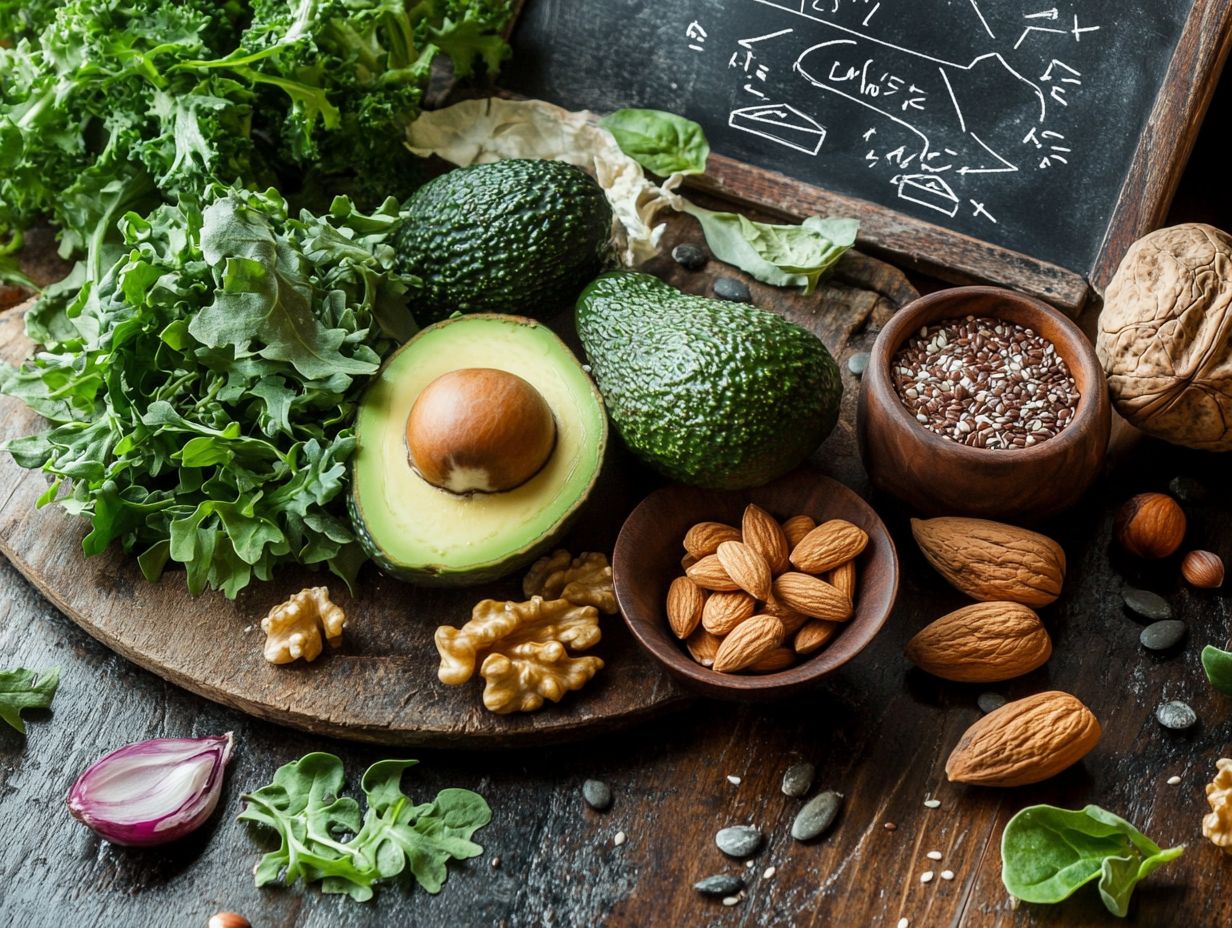
- Nutritional ketosis is a metabolic state where the body burns fat for fuel instead of carbohydrates.
- During nutritional ketosis, the body produces ketones, which provide energy for the brain and body.
- The benefits of nutritional ketosis include weight loss, improved brain function, increased energy, better blood sugar control, reduced inflammation, and enhanced athletic performance.
What is Nutritional Ketosis?
Nutritional ketosis represents a remarkable metabolic state that you can achieve through thoughtful dietary adjustments. By significantly reducing your carbohydrate intake, you encourage your body to turn to fat for energy, resulting in the production of ketones.
Many individuals pursue this state through the ketogenic diet, a meticulously crafted eating plan that emphasizes high-fat and low-carb foods, including various protein sources and vegetables. This approach enhances your body s capacity to utilize fat as its primary energy source and contributes to an array of health benefits, including improved body composition and enhanced glucose control.
How Does Nutritional Ketosis Work?
Nutritional ketosis transforms the way your body generates energy by shifting its primary fuel source from glucose usually obtained from carbohydrates to fats and ketones.
When you significantly reduce your carbohydrate intake, your body begins to adapt by breaking down stored fat into ketones for energy production. This transition enhances metabolic efficiency and supports weight loss while contributing to a more favorable body composition.
What Happens in the Body During Nutritional Ketosis?
During nutritional ketosis, your body experiences significant metabolic changes. It shifts from using glucose to relying on ketones produced from fat breakdown as its primary energy source. This process involves dietary restrictions that focus on specific food choices and meal planning.
This adaptation transforms energy production and offers various health benefits, including improved cognitive function, enhanced athletic performance, and better regulation of blood sugar levels.
As your liver breaks down fatty acids through a process known as beta-oxidation, it generates ketone bodies, such as acetoacetate, beta-hydroxybutyrate, and acetone. These ketones act as an alternative fuel source, leading to decreased insulin levels and increased fat oxidation, promoting weight loss.
The physiological effects are significant; many individuals report sustained energy levels and reduced cravings, suggesting a more stable blood sugar profile and improved cardiovascular health. Research shows that ketosis may protect the brain, potentially benefiting those with neurological disorders and fostering a heightened state of mental clarity.
Such metabolic flexibility enhances overall body function and supports your long-term health goals. It potentially reduces the risk of weight cycling and promotes sustainable weight loss.
What are the Benefits of Nutritional Ketosis?
The advantages of nutritional ketosis are remarkable, encompassing weight loss, enhanced brain function, elevated energy levels, and improved glucose control. This makes it a favored option for those seeking sustainable weight loss solutions.
By prioritizing ketogenic foods a diet low in carbohydrates and high in fats and keeping carbohydrate intake low, you may find yourself experiencing reduced inflammation and boosted athletic performance. All of this can be achieved while enjoying greater adherence to structured eating plans, making your journey both effective and satisfying.
1. Effective Weight Loss through Nutritional Ketosis
Many weight loss programs emphasize the role of nutritional ketosis for its effectiveness. Sample menus and food lists can help you adhere to this dietary approach.
Weight loss stands out as one of the most coveted benefits of nutritional ketosis. Your body efficiently breaks down stored fat for energy, making it a popular choice for many.
This process leads to improved body composition and a noticeable reduction in fat mass.
The magic happens thanks to the ketogenic diet s unique ability to induce a metabolic state that prioritizes fat utilization over carbohydrate metabolism, making it the ideal choice for anyone aiming to shed those extra pounds.
In this state, fat becomes your primary fuel source, which in turn promotes a decrease in insulin levels a key player in appetite regulation. With lower insulin levels, fat-burning kicks into high gear while hunger-stimulating hormones like ghrelin take a back seat, allowing you to feel satisfied with fewer calories.
As ketone production ramps up, you’ll likely experience enhanced energy levels alongside a natural suppression of appetite, leading to a decrease in caloric intake without the constant battle typical of traditional dieting methods. This means that, as you engage in this regimen, you’ll find it easier to maintain a calorie deficit, paving the way for sustainable weight loss over time.
2. Improved Brain Function
The Epilepsy Foundation has recognized the potential benefits of the ketogenic diet in managing neurological disorders.
Experiencing improved brain function is one of the significant advantages of nutritional ketosis. Ketones serve as a more efficient energy source for your brain than glucose, potentially leading to enhanced cognitive performance and mental clarity. Many individuals report better focus and a reduction in brain fog while adhering to a ketogenic diet, which underscores the neurological benefits that come with this metabolic state.
Research indicates that during periods of ketosis, your brain not only utilizes ketones effectively but also experiences reduced oxidative stress, a factor linked to neurodegenerative diseases. For instance, studies have shown that ketogenic diets can support cognitive function in conditions such as Alzheimer’s and epilepsy. By maintaining a sustained level of ketosis, you could experience impressive improvements in memory retention and processing speed.
The anti-inflammatory properties of ketones can safeguard your brain cells, further enhancing your overall cognitive health. Consulting with a registered dietitian can help tailor the diet to your specific nutritional needs.
These compelling findings highlight the potential role that nutritional ketosis can play in optimizing brain health and cognitive agility over time.
3. Increased Energy Levels
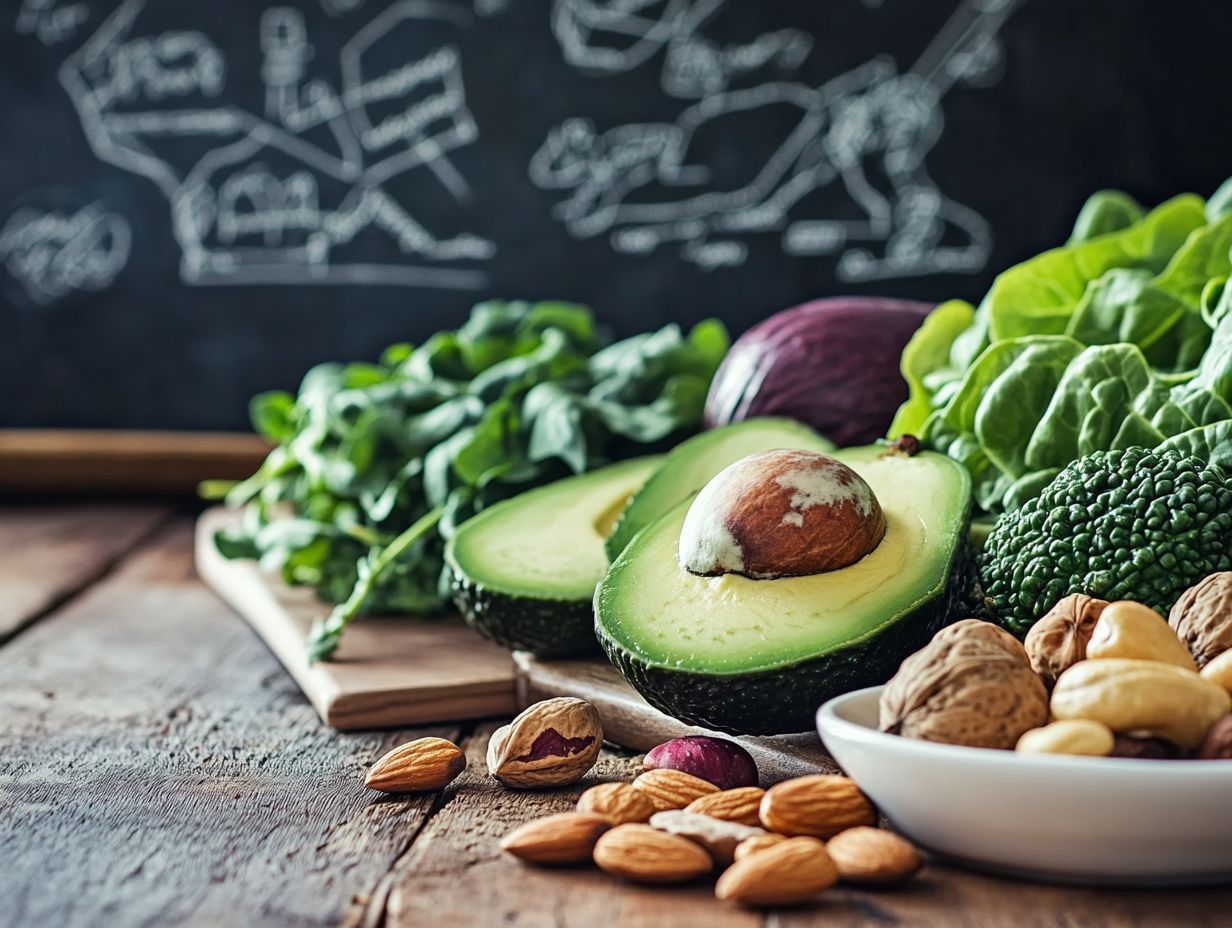
Increased energy levels can also translate into better athletic performance, allowing for greater endurance during workouts.
You may notice a remarkable increase in your energy levels when you adopt a ketogenic diet, supported by careful meal preparation and a balanced intake of nutrient-rich foods.
As your body shifts to using fat for energy production, you can enjoy a more consistent and stable energy supply throughout the day. By minimizing blood sugar fluctuations commonly associated with high-carbohydrate diets, nutritional ketosis helps enhance both your physical and mental performance.
This metabolic shift fundamentally changes how your body produces ATP, the energy currency of your cells. It leads to fewer energy peaks and troughs. Traditional carbohydrate metabolism often relies on glucose for quick bursts of energy, which can leave you feeling fatigued as your energy stores diminish.
In contrast, embracing a ketogenic lifestyle encourages your body to utilize ketones derived from stored fat, offering a more reliable and enduring source of energy. Including a variety of fat sources and considering intermittent fasting can further enhance energy production.
This transformation can profoundly impact your daily activities and athletic performance, enabling you to experience heightened endurance during extended workouts and improved focus during mentally taxing tasks!
4. Improved Blood Sugar Control
Improved blood sugar control is particularly beneficial for those with diabetes, aiding in better glucose management and overall health.
Improved blood sugar control stands out as a key advantage of nutritional ketosis, especially for those dealing with insulin resistance or diabetes. By embracing the low carbohydrate intake of the ketogenic diet, you can significantly reduce glucose spikes and achieve greater stability in your blood sugar levels. This shift not only promotes better glucose management but also leads to enhanced overall health outcomes.
When you shift your body s primary fuel source from carbohydrates to fats, nutritional ketosis works wonders for your insulin sensitivity. However, it is crucial to include dietary fiber in your meal plan to ensure comprehensive health benefits.
This change allows your cells to utilize available glucose more efficiently, reducing the amount of insulin needed to keep your blood sugar levels in check.
The presence of ketones in your bloodstream further enhances metabolic flexibility, enabling your body to respond more adeptly to fluctuations in blood glucose. For individuals facing the challenges of diabetes, this means experiencing fewer hypoglycemic episodes and smoother transitions between high and low blood sugar levels.
Ultimately, adopting a ketogenic approach, guided by dietary guidelines and frequent consultation with a healthcare provider, can enable you on your journey toward better health and stability.
5. Reduced Inflammation
Including a variety of low-carb vegetables and fruits in your meal plan can enhance the anti-inflammatory effects of the ketogenic diet.
Reduced inflammation stands out as a remarkable benefit of nutritional ketosis. However, potential health risks such as excessive fat intake should be considered and discussed with a healthcare provider.
When your body shifts its energy reliance to ketones, it often results in decreased inflammatory markers and an overall enhancement in health. Many advocates of the ketogenic diet frequently share their experiences of finding relief from chronic inflammation-related conditions, underscoring the anti-inflammatory effects linked to this way your body works.
Research supports these claims, indicating that ketosis can effectively influence inflammatory pathways and markers, such as C-reactive protein (CRP). For instance, a study published in Cell Metabolism revealed that ketone bodies can modulate the immune response, potentially leading to significant reductions in inflammation.
Anecdotal evidence from those battling autoimmune disorders emphasizes improvements in symptoms that correlate with adopting a ketogenic lifestyle. It s exciting to see how personal stories and science come together to support nutritional ketosis as a viable approach for managing inflammation levels while enhancing overall health.
In conclusion, the ketogenic diet offers numerous benefits, including increased energy levels, improved blood sugar control, and reduced inflammation, making it a compelling choice for many looking to enhance their well-being.
What are the Different Types of Ketogenic Diets?
Discover how various types of ketogenic diets can accommodate different dietary preferences and nutritional requirements while facilitating ketosis a state where your body burns fat for energy instead of carbohydrates.
Among these options, you ll find the Standard Ketogenic Diet (SKD), the Cyclical Ketogenic Diet (CKD), the Targeted Ketogenic Diet (TKD), and the High-Protein Ketogenic Diet. Each variation is designed to align with your unique lifestyle and health aspirations, ensuring that you can choose the path that best supports your goals.
1. Standard Ketogenic Diet (SKD)
Discover how the Standard Ketogenic Diet (SKD) can transform your health! The SKD is the most prevalent version of the ketogenic diet, featuring a macronutrient composition of roughly 70% fats, 25% protein, and 5% carbohydrates. This carefully designed ratio promotes ketosis by significantly cutting carbohydrate intake.
In this approach, you ll want to focus on nutrient-dense, low-carb foods that help you reach that coveted metabolic state. By prioritizing high-quality fats think avocados, olive oil, and nuts you can ensure that you not only meet your macronutrient goals but also nourish your body effectively.
The moderate protein intake, often derived from meats, eggs, and dairy, plays a vital role in preserving muscle mass as you enter ketosis. Limiting carbohydrates to low-glycemic vegetables minimizes insulin spikes, creating an environment that encourages fat burning.
This intentional selection of macronutrients provides a stable energy source from fats, guiding your body into a phase where it primarily relies on ketones rather than glucose for fuel. This shift not only enhances cognitive function but also supports effective weight management.
2. Cyclical Ketogenic Diet (CKD)
The Cyclical Ketogenic Diet (CKD) offers you the opportunity to alternate between strict ketogenic eating and days of higher carbohydrate intake, providing a level of flexibility while still pursuing ketosis. This approach is particularly advantageous for athletes or anyone striving to sustain performance while following a ketogenic diet.
Typically, a CKD cycle lasts about a week. During this time, you may adhere to a stringent low-carb phase for five to six days, followed by one to two days of increased carbohydrate consumption. This strategic cycling serves to replenish glycogen stores in your muscles, which is essential for optimal performance during high-intensity workouts.
The brief duration of carbohydrate refeeding can amplify the benefits of ketosis, such as enhanced fat oxidation and elevated energy levels, without completely derailing your metabolic state. As a result, this diet is especially attractive to fitness enthusiasts, bodybuilders, and individuals involved in endurance sports, as it skillfully balances the demand for energy with the goal of fat loss.
3. Targeted Ketogenic Diet (TKD)
The Targeted Ketogenic Diet (TKD) allows you to enjoy small amounts of carbohydrates around your workouts while primarily sticking to a ketogenic dietary pattern. This means you can achieve ketosis without sacrificing your athletic performance. It s particularly beneficial for those who need quick energy sources during high-intensity activities.
By strategically timing your carbohydrate intake, you can effectively replenish glycogen stores, supporting your demanding training regimens. The TKD offers a unique balance that lets you reap the fat-burning benefits of ketosis while still having glucose available for those explosive efforts.
This method not only boosts your endurance but also aids in your recovery, as those post-workout carbs can help alleviate muscle soreness and restore your energy levels more efficiently. Focusing on healthy fats further enhances cognitive function and overall endurance, setting you up for optimal performance in even the most challenging sports disciplines.
Conclusion
Choosing the right type of ketogenic diet can significantly impact your health and fitness journey. Each variation be it SKD, CKD, TKD, or the High-Protein Ketogenic Diet offers unique benefits tailored to different lifestyles and goals. Embrace the option that resonates with you and enjoy the transformative effects of keto!
4. High-Protein Ketogenic Diet
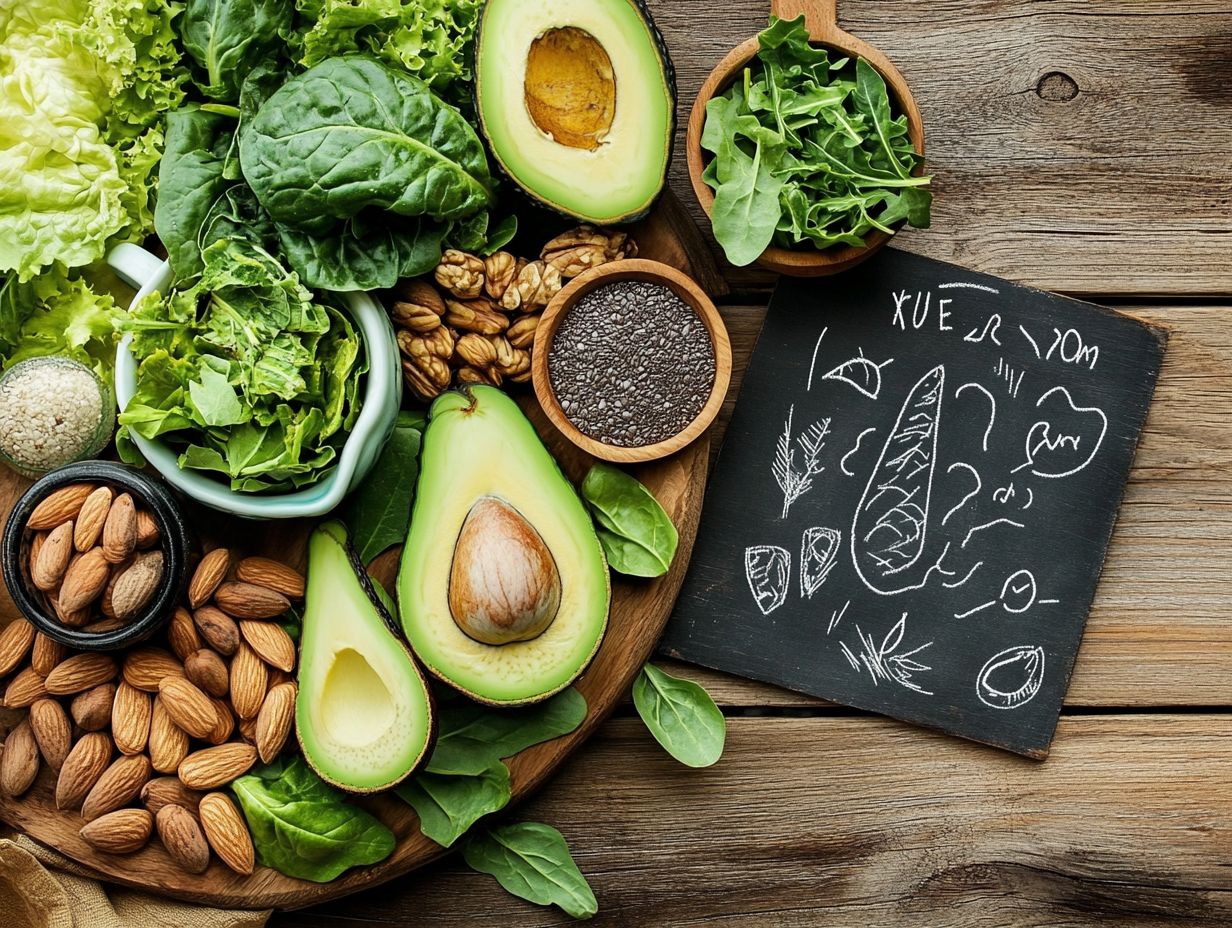
Are you ready to transform your body? The High-Protein Ketogenic Diet offers a refined approach, emphasizing a greater protein intake than the traditional ketogenic diet. Typically, it consists of approximately 60% fats, 35% protein, and 5% carbohydrates. This diet helps you maintain nutritional ketosis while catering to your higher protein needs, making it especially beneficial for anyone aiming to preserve muscle mass during weight loss.
By concentrating on whole food sources like lean meats, fish, eggs, and low-carb vegetables, you can easily meet your macronutrient ratios while savoring a delightful array of flavors and textures. Excellent protein sources include chicken breast, turkey, and tofu. Healthy fats can be found in avocados, nuts, and olive oil.
This diet supports weight management and fits well with an active lifestyle, making it a superb choice for athletes and fitness enthusiasts eager to enhance performance without compromising their health. Start your high-protein ketogenic journey today and feel the difference!
How to Achieve Nutritional Ketosis?
To achieve nutritional ketosis, concentrate on limiting your carbohydrate intake while significantly increasing your fat consumption. It s also important to moderate your protein intake to align with your dietary needs.
This careful balance is crucial for transitioning your body into a state where it efficiently utilizes fat for energy, ultimately leading to the production of ketones.
1. Limit Carbohydrate Intake
Limiting your carbohydrate intake is essential for achieving nutritional ketosis. This encourages your body to deplete its glycogen stores and transition to fat metabolism for energy. Embrace a diet rich in low-carb foods to accelerate the onset of ketosis and enhance fat breakdown.
To reduce your carbohydrate consumption effectively, focus on incorporating foods like leafy greens, avocados, nuts, seeds, and low-carb vegetables into your meals. Avoid refined sugars and starchy foods such as pasta, bread, and rice, as they can spike your blood sugar levels.
Meal planning is key to maintaining this dietary shift. Craft a weekly menu that emphasizes protein-rich options like fish, poultry, and eggs to help keep cravings at bay. Preparing your meals in advance ensures easy access to low-carb choices, reducing the temptation to indulge in high-carb alternatives when hunger strikes.
2. Increase Fat Intake
Increasing your fat intake is essential for achieving nutritional ketosis, as fats become your primary energy source in this metabolic state. Emphasizing high-fat foods in your diet not only supports energy production but also ensures that your body has the necessary resources to produce ketones.
Focus on incorporating healthy fats that can sustain your energy levels. Sources like avocados, nuts, and seeds are excellent for providing essential fatty acids. Olive oil and coconut oil are superb choices for cooking and dressings, adding flavor and healthy fats to your meals. Fatty fish, such as salmon and mackerel, deliver omega-3 fatty acids and promote overall heart health. Full-fat dairy products like cheese and yogurt can enrich your diet and help you meet the necessary fat ratios for maintaining a state of ketosis.
By prioritizing these high-fat food options, you can enhance your dietary intake while ensuring a smooth and effective transition into nutritional ketosis.
3. Moderate Protein Intake
Moderating your protein intake is vital for achieving and maintaining nutritional ketosis. Excessive protein can convert to glucose through a process where the body creates glucose from non-carbohydrate sources, which may hinder your transition into ketosis. By selecting appropriate protein sources and balancing your intake, you can optimize your dietary habits while still supporting muscle preservation.
This balance becomes especially critical when you re following a ketogenic diet, where the primary goal is to shift your body into a fat-burning state. High-quality protein sources like grass-fed meats, fatty fish, eggs, and certain dairy products not only deliver the essential amino acids you need but also align perfectly with the low-carb principles of keto.
Aim for protein to make up about 20-25% of your daily calories for optimal results, depending on your personal goals and activity level. By being mindful of these factors, you can effectively navigate your protein consumption to enhance your overall metabolic health, body composition, and sustain your energy levels without disrupting your ketogenic journey. Integrating a variety of protein sources can help you meet your nutritional needs.
Is Nutritional Ketosis Safe for Everyone and What Are the Dietary Guidelines?
While you may discover the advantages of nutritional ketosis appealing, it s crucial to consult with a healthcare provider or registered dietitian to assess its safety and suitability for your unique health conditions and dietary needs, especially if you are considering significant dietary changes or have existing medical conditions.
A high-fat diet can carry certain health risks, making professional guidance critical for anyone contemplating this dietary shift. Prioritizing expert advice ensures that you make informed choices tailored to your well-being and helps you understand the potential health benefits and risks associated with this type of diet.
1. Potential Side Effects and Health Risks
Potential side effects of nutritional ketosis may include what s commonly referred to as the “keto flu.” This term encompasses flu-like symptoms you might experience during those initial adaptation days, along with the potential for nutrient deficiencies and other health risks if you don’t plan carefully. Understanding these side effects is crucial for anyone embarking on a ketogenic journey, as it can pave the way for a smoother transition into ketosis and better overall health.
During this phase, you might find yourself grappling with fatigue, headaches, irritability, and some digestive hiccups, like constipation. These symptoms often arise from your body’s shift in energy sources and imbalances in electrolytes. Changes in your dietary habits can also contribute to these initial challenges.
To help alleviate these uncomfortable feelings, it s wise to ramp up your water and electrolyte intake, paying special attention to sodium, potassium, and magnesium. Gradually scaling back your carbohydrate intake, rather than making a sudden leap, can ease your adaptation process. Incorporating fiber-rich low-carb vegetables and other nutrient-rich foods will not only support your digestive health but also ensure that your transition into ketosis is both comfortable and nutritionally balanced. Understanding your body’s nutritional needs during this phase is crucial.
2. Who Should Avoid Nutritional Ketosis and Why?
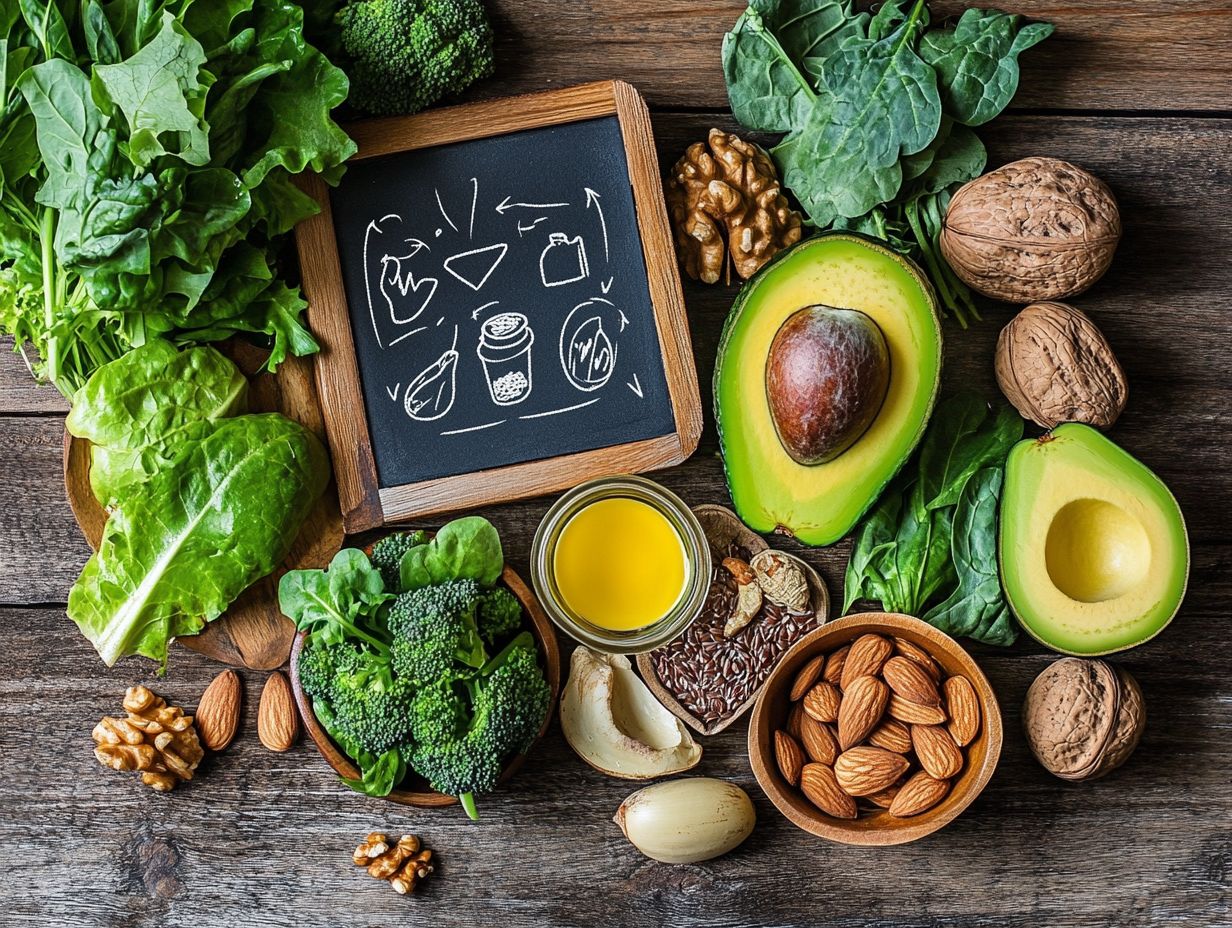
If you have specific medical conditions or dietary restrictions, it s crucial to steer clear of nutritional ketosis without first consulting a healthcare provider or registered dietitian. There are possible health problems involved, especially if you have conditions like pancreatitis, liver disease, or metabolic disorders that may not mesh well with a high-fat diet.
Professional guidance is essential. Ensuring you follow proper dietary guidelines and food choices can help mitigate some of these risks.
If you have a history of eating disorders, kidney issues, or type 1 diabetes, you should approach nutritional ketosis with heightened caution. For those with eating disorders, the focus on fat consumption can trigger unhealthy behaviors or even lead to a relapse.
Individuals facing kidney problems might experience complications, as the diet s high protein intake can put additional strain on kidney function.
Those with cardiovascular health concerns should be careful about their fat sources and overall diet.
Regarding type 1 diabetes, strict adherence to this dietary model could result in dangerous fluctuations in blood sugar levels if not monitored properly. It s vital that you consult with nutrition experts to ensure your dietary choices are safe and conducive to your overall well-being.
Monitoring glucose control and understanding the impact of carbohydrates on your diet is essential.
Frequently Asked Questions About Nutritional Ketosis
What is Nutritional Ketosis and How Does It Work?
Nutritional ketosis is a metabolic state in which the body uses stored fat as its primary source of energy instead of glucose. This is achieved by following a low-carbohydrate, high-fat diet, also known as a ketogenic diet. The breakdown of fat into ketones for energy production is fundamental in this process.
How does Nutritional Ketosis work?
When the body is in a state of nutritional ketosis, it produces molecules called ketones from stored fat. These ketones are then used by the body as fuel instead of glucose.
This process is known as ketosis and is a natural survival mechanism.
What are the Health Benefits of Nutritional Ketosis?
Numerous studies have shown that nutritional ketosis can have various health benefits, including weight loss, improved blood sugar control, increased energy, improved brain function, and reduced inflammation.
It can also aid in better cardiovascular health, glucose control, and sustainable weight loss when integrated into a structured eating plan.
Is Nutritional Ketosis Safe for Everyone and What Are the Dietary Guidelines?
While nutritional ketosis is generally safe for most people, it may not be suitable for those with certain medical conditions, such as type 1 diabetes, pancreatitis, or liver or kidney disease.
It is always best to consult with a healthcare professional before starting any new diet or lifestyle change. Adhering to dietary guidelines and understanding your individual nutritional needs are key components for success.
Can I Eat Any Type of Fat on a Nutritional Ketosis Diet and What Are the Best Fat Sources?
Not all fats are created equal, and it is important to focus on healthy, natural sources of fat on a nutritional ketosis diet. Good sources of healthy fats include avocados, nuts and seeds, olive oil, and fatty fish.
Avoid processed and trans fats as much as possible. Including a variety of ketogenic foods in your meal plan can help you maintain dietary compliance and achieve the health benefits associated with this diet.
How Long Does It Take to Enter Nutritional Ketosis and What Factors Influence This?
The time it takes to enter nutritional ketosis varies from person to person, but it usually takes anywhere from 2 to 7 days.
Factors such as individual metabolism, current diet, and activity levels can all play a role in how quickly one enters ketosis.
Stay patient and consistent to make the ketogenic diet work for you! Incorporating intermittent fasting and adjusting your carbohydrate intake can also influence the speed at which you reach this metabolic state.
If you have any experiences or questions about nutritional ketosis, feel free to consult a nutritionist or share your thoughts for a more interactive discussion!



